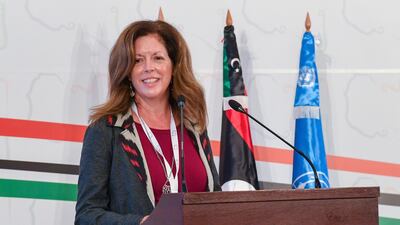Libya's Political Dialogue Forum, aimed at bringing peace to the nation, seemed set to falter this week as almost half of those taking part raised concerns over the process to form a transitional government.
The UN-led talks have run for less than a month among 75 delegates representing the country’s two rival assemblies and some UN-selected independents.
They have been debating how to move the country forward from the power vacuum and in-fighting left by the removal and killing of former dictator Muammar Qaddafi in 2011.
There are now 74 delegates after Libyan MP Omar Qarmil died in Morocco from coronavirus.
Two rival administrations, the Government of National Accord and an eastern administration backed by part of the elected parliament, have been vying for control of the country.
The forum was successful in bringing all sides to the table and reaching a consensus on a new interim unity government to plan a map to parliamentary and presidential elections.
Members set a date for those elections to be held in December next year.
But on Monday, 30 members of the committee in Tunisia hinted at their intention to withdraw from the rest of the dialogue on Monday.
The members rejected new proposals presented by the UN mission to Libya to reduce the threshold of votes needed to appoint the president of the Presidency Council, two deputies and the prime minister.
In a letter to the mission, which its leader Stephanie Williams shared on Twitter, the dissenting members said the new proposals are "different formulas for a single content designed or tailored to specific people".
They stressed their rejection of any "attempt to circumvent or ignore the majority vote in the dialogue forum".
Meanwhile, UN Secretary General Antonio Guterres proposed that Middle East envoy Nickolay Mladenov becomes his Libya special envoy, replacing Ghassan Salame who stepped down in March because of stress.
If there are no objections from any of the 15 Security Council members by Tuesday evening, the appointments will be approved.
That would end months of dispute sparked by a US push to split the Libya role, to have one person running the UN political mission and another focused on conflict mediation.
Mr Mladenov has been the UN Middle East envoy since 2015.
The UN Support Mission in Libya said progress had been made on steps to stability following its meeting in Geneva.
"Participants agreed that the current economic situation is unsustainable and that Libyan institutions must take steps towards functional unification," the UN mission said on Tuesday.
"Participants outlined steps to consolidate the national budget. This includes unifying and rationalising the public sector payroll, allocating sufficient funding for development and infrastructure throughout the country, effectively managing the mounting national debt and addressing the Covid-19 pandemic.
"The participants agreed to meet again in January to review progress on these issues and consider further technical steps needed to stabilise the Libyan economy and respond to the needs of all Libyans."


